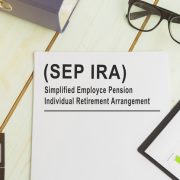Self-Directed SEP IRAs – The Basics
 Many people have already heard about real estate IRAs, gold IRAs, and Self-Directed IRAs in general. What is less well understood, however, is that the self-direction concept isn’t limited to IRAs. You can also gain the same flexibility, versatility and potential for diversification from other kinds of retirement plans as well – including the Simplified Employee Pension Plan, or SEP IRA.
Many people have already heard about real estate IRAs, gold IRAs, and Self-Directed IRAs in general. What is less well understood, however, is that the self-direction concept isn’t limited to IRAs. You can also gain the same flexibility, versatility and potential for diversification from other kinds of retirement plans as well – including the Simplified Employee Pension Plan, or SEP IRA.
SEPs have become very popular with small business owners in recent years for a variety of reasons:
o They offer generous contribution limits that are several times higher than those for IRAs. In 2014, SEP plan sponsors can contribute up to 25 percent of compensation to their SEPs, up to an annual limit of $52,000.
o They are much less expensive to set up than traditional 401(k) plans and defined benefit pension plans.
o They do not lock business owners into making a specific contribution every year.
o They do not require an actuary
SEPs are particularly well suited to self-employed individuals or owner-operators who are the only full-time employee of their own businesses, and who have a significant amount of free cash flow to invest. However, you are not obligated to invest in the SEP if you have a tough year. If you do have employees, however, and you choose to fund your own account, you must fund theirs as well.
SEP Eligibility
To participate in a SEP IRA, an employee must be at least 21 years old and must have worked for the company in at least three of the last five years.
Self-Directed SEP Investment Options
- Like their IRA cousins, SEPs allow you to self-direct. If you are dissatisfied with the mediocre returns commonly available in mutual funds and publicly traded stocks and bonds. As s SEP Owner, you can own any of these alternative asset classes within your self-directed SEP IRA:
o Rental real estate
o ‘Fix and flip’ properties
o Commercial real estate
o Tax liens and certificates
o Private lending
o Hard-money lending
o Land banking
o Private equity
o Closely-held companies
o Partnerships and LLCs
o Gold and other precious metals (with some restrictions)
o Unregistered securities
o Individual stocks and bonds
…And much more. Just be sure not to try to invest your SEP money in a small list of assets the IRS prohibits within retirement accounts:
o Gems and jewelry
o Life insurance
o Collectibles
o Alcoholic beverages
o Certain forms of precious metals of inconsistent purity standards.
There are also some restrictions on counterparties in your SEP transactions. Specifically, your SEP IRA cannot directly conduct business with you, your spouse, your direct ascendants, descendants, any of their spouses, nor any entity controlled by them. You cannot buy from, sell to or rent to any of them, nor can you lend SEP money to or borrow from them – even if your SEP is engaged in the business of lending money. These rules are designed to prohibit the abuse of the tax advantages of the SEP IRA.
Who Should Consider a Self-Directed SEP IRA?
Consider a self-directed SEP IRA if many of the following criteria apply to you:
- You are a sole proprietor, independent contractor or self-employed
- You want to make contributions for yourself as well as for any employees
- You don’t want to be locked in to an inflexible contribution every year
- You have a significant amount – over IRA limits (currently $5,500 or $6,500 for those aged 50 and older) to invest every year
- You want a broader array of investment options than those available to you in an ‘off-the-shelf’ program.
Self-Directed SEP IRA Contribution limits
The current contribution limit is 25 percent of your total compensation for the year, up to a maximum contribution of $52,000.
To learn more, simply log on to our website and enroll in one of our free, no-obligation webinars. We’ll walk you through all the basics. Or give us a call at 1-866-7500-IRA (472). We can walk you through the process and give you a personalized assessment for your own particular circumstances.
Image by: presentermedia.com






